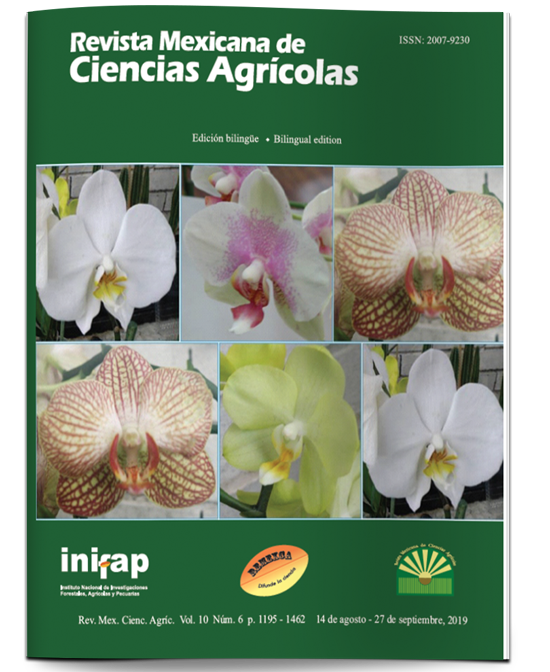Tomato spotted wilt orthotospovirus (TSWV) is not transmitted by tomato seed
DOI:
https://doi.org/10.29312/remexca.v10i6.1519Keywords:
Solanum lycopersicum L., in vitro, Das-Elisa, RT-PCR, seed, TSWVAbstract
To date, more than 231 viruses capable of being transmitted by seed are reported externally or internally, this transmission is one of the most important factors in the epidemiological development of diseases of viral origin of early infection. The spotted wilt virus of the tomato spot wilt orthotospovirus (TSWV), Orthotospoviridae) affects more than 900 plant families including Solanaceae, its main transmission is by vector insects such as thrips, however, little is known of its possible transmission through of seed. The objective of this work was to determine the possible transmission of TSWV by seed of infected tomato plants using serological techniques and RT-PCR in its detection. Tomato fruits were collected from plants naturally infected with TSWV previously analyzed by Das-Elisa and positive for the virus from four regions of the State of Mexico. Subsequently, the seeds of the diseased fruits were extracted, one group had the detection of the virus by Das-Elisa in embryo and testa and the other group of seeds were grown in vitro culture for 15 days. Once the seedlings were obtained, RNA extraction and RT-PCR were carried out, using nucleocapsid-specific oligos. In vitro embryo, seed and seedling analyzes with Das-Elisa and RT-PCR (respectively) were found to be negative for TSWV in the treated samples. Apparently, there is no virus infection in in vitro embryo, testa and tomato seedlings.
Downloads
Downloads
Published
How to Cite
Issue
Section
License
The authors who publish in Revista Mexicana de Ciencias Agrícolas accept the following conditions:
In accordance with copyright laws, Revista Mexicana de Ciencias Agrícolas recognizes and respects the authors’ moral right and ownership of property rights which will be transferred to the journal for dissemination in open access. Invariably, all the authors have to sign a letter of transfer of property rights and of originality of the article to Instituto Nacional de Investigaciones Forestales, Agrícolas y Pecuarias (INIFAP) [National Institute of Forestry, Agricultural and Livestock Research]. The author(s) must pay a fee for the reception of articles before proceeding to editorial review.
All the texts published by Revista Mexicana de Ciencias Agrícolas —with no exception— are distributed under a Creative Commons License Attribution-NonCommercial 4.0 International (CC BY-NC 4.0), which allows third parties to use the publication as long as the work’s authorship and its first publication in this journal are mentioned.
The author(s) can enter into independent and additional contractual agreements for the nonexclusive distribution of the version of the article published in Revista Mexicana de Ciencias Agrícolas (for example include it into an institutional repository or publish it in a book) as long as it is clearly and explicitly indicated that the work was published for the first time in Revista Mexicana de Ciencias Agrícolas.
For all the above, the authors shall send the Letter-transfer of Property Rights for the first publication duly filled in and signed by the author(s). This form must be sent as a PDF file to: revista_atm@yahoo.com.mx; cienciasagricola@inifap.gob.mx; remexca2017@gmail.
This work is licensed under a Creative Commons Attribution-Noncommercial 4.0 International license.



